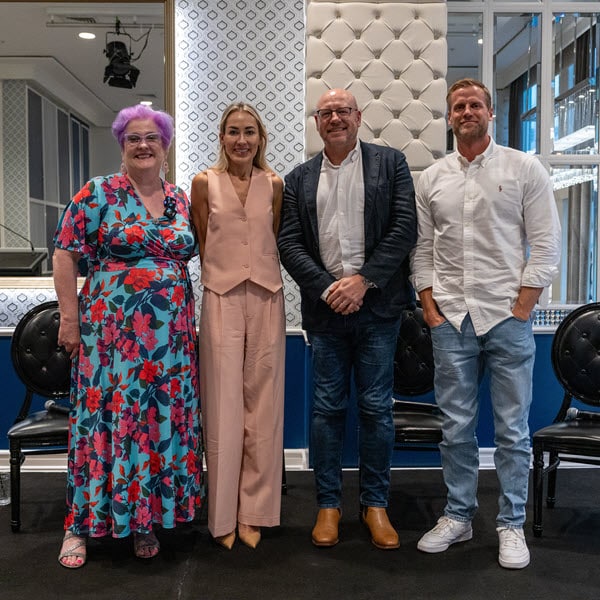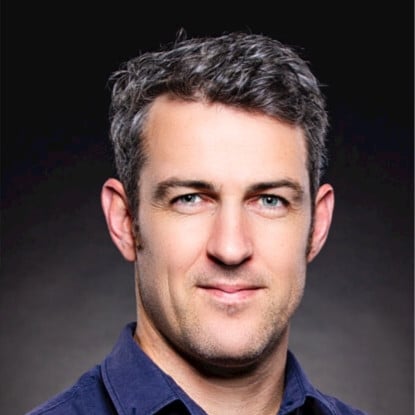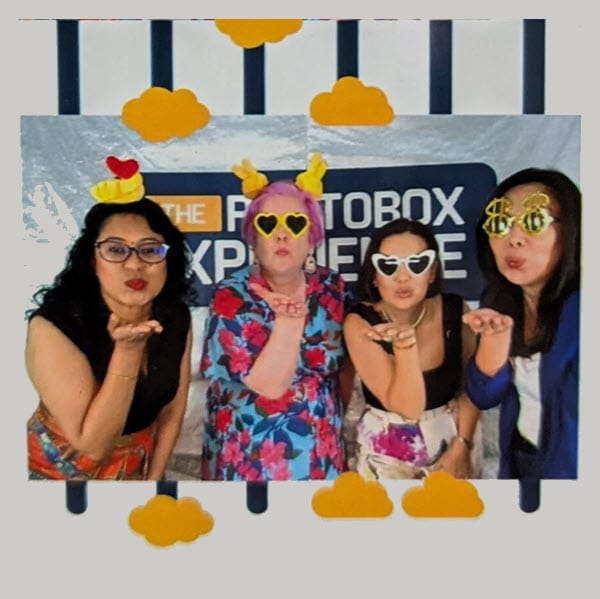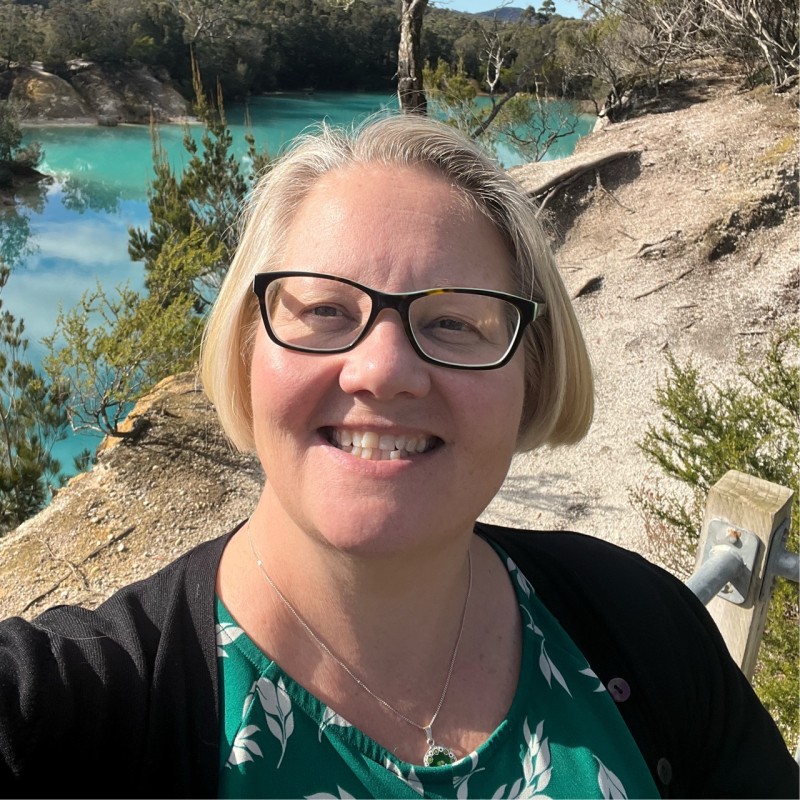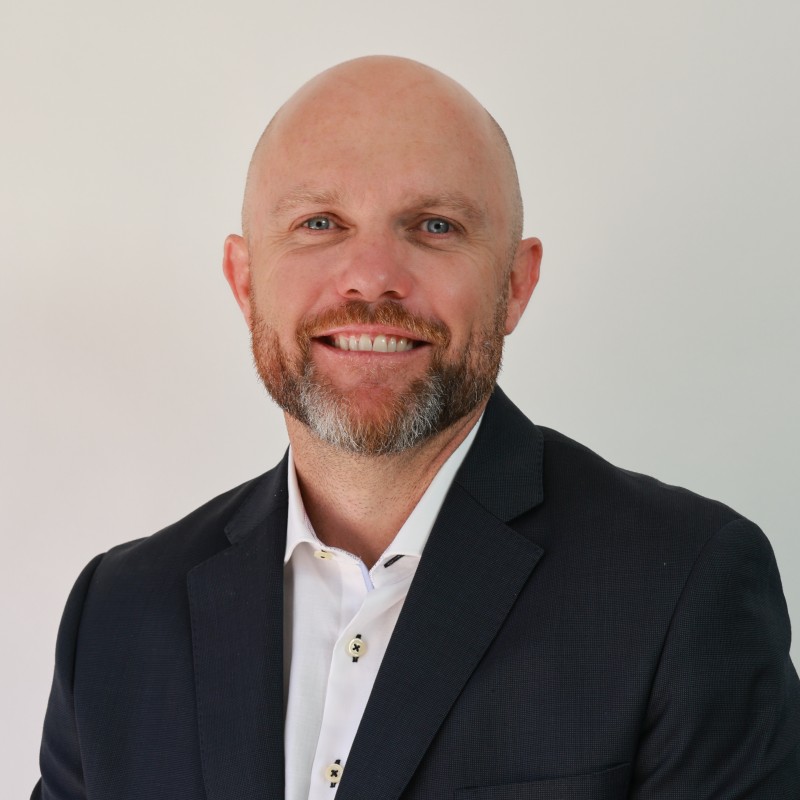“Employees always come before the customer, because if you have happy employees and if you have a really good healthy culture in place, then your employees are going to provide an outstanding service to your clients.”
Brian Walsh, Country Manager ANZ of TOA Global
Today’s interview is different from our normal interviews. I invited Brian Walsh, Country Manager ANZ of TOA Global formerly known as The Outsourced Accountants to join our Community supporting Community afternoon chat where we talked about How to Build Culture While Working Remotely.
In an effort to support the Accounting and Bookkeeping profession, I created a community that meets every weekday afternoon, to decompress and support one another during these challenging times. As the weeks have gone on, it’s evolved into an opportunity to cultivate conversations around areas of interest to us, while continuing to care for each other in this new normal.
Below is the transcript of the conversation I had with him. If that piques your interest, watch the rest via the video, or search for it on your podcast listening device – this is a long episode – hopefully, for you, that’s an opportunity for a long peaceful walk while listening to your community. And to that point, while I’m guiding the conversation, other people from the community are active participants in the conversation.
Oh! And there’s a surprise at the very end if you listen all the way through. I hope you gain some useful insights and knowledge from the conversation.
Could you please just briefly share with us who you are, where you’re from, and just a bit about Brian Walsh?
Brian Walsh: So Brian Walsh, I’m the Country Manager for TOAGlobal. I’m Irish, as you haven’t guessed. So my background is, I was a hedge fund accountant for a number of years with JP Morgan. Then I moved into the technology space. So I worked for PayPal for about seven years, built up their small business, their part in the early days in Ireland for the UK, managing the UK operations and then relocated to the Sydney office and built out the same in Sydney. And then at that stage, we just, myself, my family decided we were going to stay and live in Australia. So at the time, Intuit was launching in Australia and I was asked, would I be part of that team? And yeah, we launched Intuit then I guess that was the history in itself. And then here I am in TOA Global.
Brian Walsh introductory video to get to know him better
Heather Smith: Awesome. Thank you for sharing that with us. And I’ll also share with everyone that Brian recently gained his Australian citizenship, so congratulations on that and we’re going to have a vote towards the end about whether we want Brian to sing the Australian national anthem. Emma’s already voted yes.
Brian Walsh: So when we did our Australian citizenship or citizenship last week, and my wife’s a teacher’s aid for kids with very high disabilities. So she knows the national anthem, of course, inside out, my kids know it, my wife’s able to do it in sign language. And I’m the only person in the room that has to read it off the board. So, apologies, I have to learn this.
Heather Smith: Well, you have time to Google it while we talk. I’m not letting you out of it.
Brian Walsh: I’m male, I can’t multitask.
Heather Smith: Thank you, Brian. So now onto the topic that we’re discussing today, people, how to build a culture while working remotely. Culture is a bit of a buzzword these days.
When you refer to the word culture, what do you mean?
Brian Walsh: For me personally, what do I mean by culture? I actually think it’s the business’s personality. That’s how I would refer to it. It’s something that I’m extremely passionate about and always have been, I think culture is one of the… Getting your culture right in your business is so, so fundamental to actually building a high performing team. And that doesn’t matter if it’s one person or 100 people. Getting your culture right, it’s being aligned on your values, it’s how you make decisions. So for me, that’s what culture is.
Heather Smith: Yeah. And I think that people have mentioned to me, they’re struggling with identifying their client base. And one of the things that we’ve drawn on a few times is their personality.
Why is culture so important within an organisation?
Brian Walsh: So culture for me in an organisation, it’s what drives the business in a lot of senses. I think that if… I’m a firm believer that employees come first. Employees always come before the customer, because if you have happy employees and if you have a really good healthy culture in place, then your employees are going to provide an outstanding service to your clients. And it’s also really good for retention. If you have a good culture, it’s one of the reasons they come to work. It’s what they believe in, it’s what the love, it’s what they see when they come in through the door to work or it’s what they see when they open up a Zoom link to talk to their team and in this, which is so important at the moment with so many people having to work in remote environments, so much separation with people. And in our business especially, we have 1,600 people that are all working from home and that’s tough to manage and you really have to make sure that people are engaged.
Brian Walsh: I mean, health and wellness and everything comes into this. And one of the things I would say is, for good culture in a remote organisation, the first, it all starts with trust. So you have to trust your team, if you trust your team, then that helps develop the culture because culture comes from within, it’s developed by your team as well with good leadership.
Heather Smith: Yeah, absolutely. I know I left the company that… I left it because I loved it so much and I loved it more than they did. And I was like, the balance is incorrect here. I need to go and build my own company that I can love because I love it more than they do.
So do ping pong tables, branded t-shirts, and doughnut Fridays equal culture?
Brian Walsh: Look, some people buy into that. I think they’re props, that’s what I would say.
Heather Smith: Oh, props.
Brian Walsh: I think, look, ping pong tables, doughnut Friday, and in this environment, Uber Eats Friday, they are important, but they are not what drives the culture. To build a good, healthy culture, that comes from good leadership. And if you have good values and you’re a good leader and you have a vision and you believe in your people, well, it’s very easy to build a really good culture and a high performing culture.
How do we nurture a supportive and strong culture while actually working remotely?
Brian Walsh: Yeah. So I guess this is actually a question I’ve been asked quite a lot lately by a lot of people. And this is not just because we have a lot of remote employees, but it’s also, for a lot of firms, not even in the accounting, just broader industries have reached out about this. Look, what’s happening at the moment is so many people are working in remote environments and they feel they’re siloed. They feel they’re alone. They’re getting lonely and that should not be the case. I think this community group is an absolutely amazing idea and there’s a number of these kind of groups that just really give people a place where they can come together, they can talk, they can learn. It’s like the virtual offices I would call it.
Brian Walsh: And I feel what’s important is having your daily huddles. So if it’s just one person, if it’s 10 people, if it’s 20 people, have your morning huddle, make sure you’re checking in with your teams regularly, make sure you have the technology setup that you can actually interact with everybody. And it’s interesting, just having the little bit of banter throughout the day, the emojis, the fun remarks, they are all things that make us feel like we’re back in the office. When we had the lockdown in Queensland, we had to disperse the team here. Look, we’re very lucky to be able to be back in the office, but while we were out, there was the team, they were lonely. And it’s the same as our teams that are in the Philippines. There’s a lot of people that are stuck out in remote areas that they struggle and you start to struggle and then that can impact your mental health. It impacts your performance. And it has a knock-on effect.
Brian Walsh: So having those huddles, regular check-ins, having the fun throughout the day, have fun online just the way you would in your office. One of the things we did recently which was really cool, was we had a game of virtual bingo across our business and there was so much engagement from all the team and there was one person I spoke to yesterday who, she’s based in, I think she’s just based outside of Clark. And she said the highlight of her month was actually the virtual bingo. For me, that was such a little thing can make such a big difference. And this girl, she hasn’t left her house in months.
Heather Smith: You know what you need to do? You need to do a running, “How do you pack your dishwasher?” session with them. I think that was the high for us, the unexpected highlight for us.
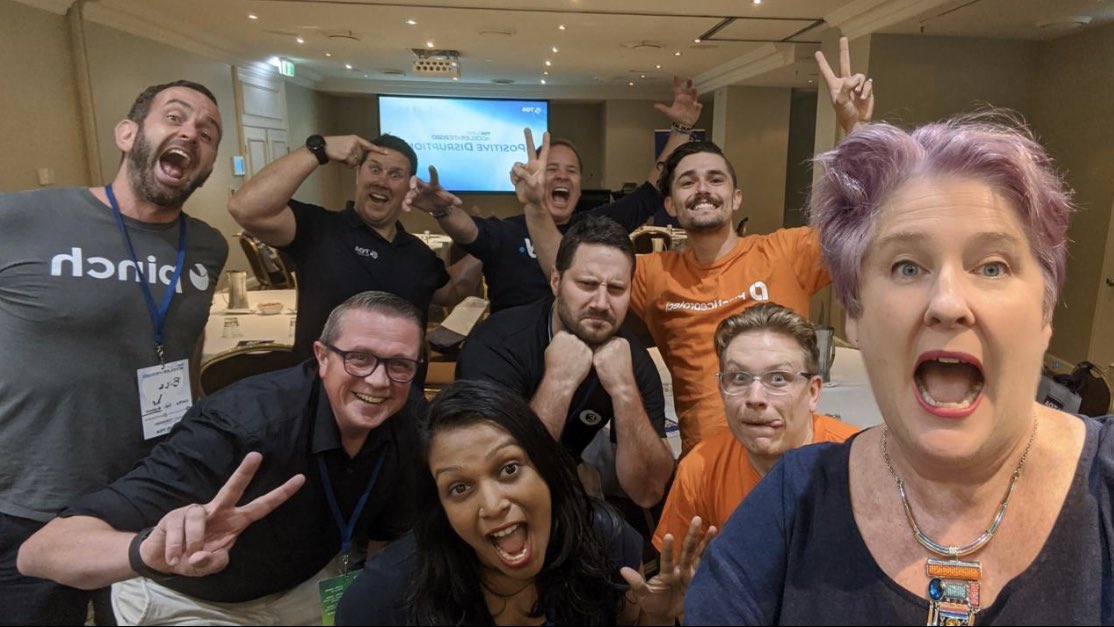 Brisbane Crew for the TOA Road Show, March 2020
Brisbane Crew for the TOA Road Show, March 2020
How do you balance huddles with micromanaging and overwhelming them with micromanagement?
Brian Walsh: So, I have to be totally honest on this one, a pet hate of mine is micromanagement. If it goes down that road with anybody, I feel that there’s fundamental issues. And before it ever gets to that stage, I’m a real firm believer in coaching and mentoring people. And if people can’t be coached and mentored, well, then they’re in the wrong position. If it comes to micromanagement and all the people that I have had that have managed various teams over the years, I’ve always made it very clear that I don’t want to ever see them micromanaging. And if it comes to micromanagement, what you’re actually doing is you’re damaging someone’s confidence because they’re obviously in the wrong role.
Brian Walsh: So you should never put somebody in that situation where they’re in the wrong role. You should either find them a role that suits them, that they can perform in, or you help them find something else in a different organisation. It should not get to the stage of micromanagement. To the point of how you’re managing people in remote teams, look, I think balancing huddles, especially in a busy environment. And look, we’re all extremely busy people. I mean, especially at the moment, I mean, the work you guys are doing across the board is unbelievable. And I keep thinking of, every time I talk to somebody in the accounting and bookkeeping industry, my heart really goes out because I can see the amount of work that you guys are having to do, the hours you’re having to put in, and you’ve invested so much in your businesses to be able to get time back in your days to spend with your families and to do other things. But at the moment, that’s all gone out the window. And then have to manage a team on top of that, it’s difficult.
Brian Walsh: But what I will say is, if you take that time to actually have your morning huddle or whatever, it’s an afternoon catch-up. And then to have your phone open with Teams, Slack, whatever it is, keep messaging throughout the day, having that fun, but also make sure you’re very clear on what the expectations are. So it’s not micromanaging, but you have to be clear on, this is a new world, this is what the expectation is, and this is what we need to deliver by a certain date. And if you set those clear expectations, people will deliver.
Heather Smith: Yeah, absolutely. Thank you for that. And John’s put in the chat area that he 100% agrees with you and Carla’s put in the chat area that her team didn’t do well in the virtual bingo. You’ll need-
Carla: I heard about it the next day. They told me all about it and they said, “Oh, we did terrible.” And I said, “Oh, well, I’m sure there’ll be another one.”
Brian Walsh: Yeah, I think this is going to be run again, but actually I think we’re looking to try and put a twist on it and include the clients.
Carla: You could include the clients.
Brian Walsh: Yeah.
Carla: That’s what I said. I said, “I missed out. I wanted to be part of that.”
Brian Walsh: So I didn’t know. I didn’t know about this until I heard from a team member yesterday. I’m like, “I didn’t even get to join this.”
Carla: No, I think that would be a great idea. That would build a bit of fun obviously within the TOA team, but also including the clients involved.
Brian Walsh: Yeah. And I mean to that point, Carla, I mean, that’s just something very little and we actually have a bit of a tech genius in the Philippines who was actually able to design that programme to do the virtual bingo, which is pretty awesome and someone that did this on their own time. But we’re actually looking now to see if there’s other things we can build that we can do these kind of virtual team building events and doing all this. But I mean, you don’t have to, if it’s small teams, you can do other things, other fun games while you’re in these virtual environments.
Heather Smith: Yeah. Yeah. And I think that the virtual teams can be microscopic, can be very small and they can be very large as well, and both have a need and importance in the area. So Brian, we currently have a spectrum of traditional office co-working space through to the remote worker sitting in absolute isolation.
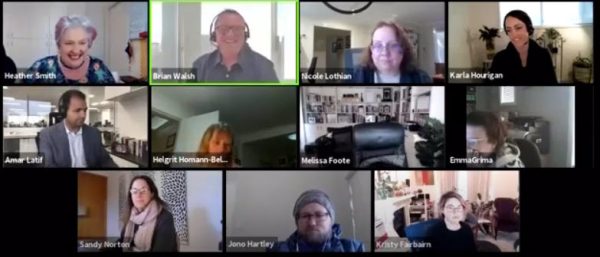 Brian Walsh joining the Community supporting Community afternoon chat and answering attendees’ questions
Brian Walsh joining the Community supporting Community afternoon chat and answering attendees’ questions
How do you manage the team culture when all of the different people may be more productive or less and effective in those different environments? And especially now that you might have found, oh, that person who’s now out remote is more productive or effective? How do we manage that?
Brian Walsh: Yeah. So that’s an interesting point you make. So, I guess because of the position I’m in, I get to see this across the board from hundreds of firms across our own business and to see how productivity is across the board. What I have noticed is, yes, there is some productivity gains with people in a remote environment. They’re initial, from what I’m seeing. So at the start, there’s great productivity, it’s a new environment, it’s like starting a new job. You’ve got the spring in your step, your new environment, but after a while, it starts to decline slightly. And that’s what I have noticed and that’s where the working from home environment, yes, it can be great for some people, but for others, it can actually be quite damaging. They can be very negative in the productivity, it can be difficult to manage, there’s a lot of distractions around people and in some, not so much in our industry, but in some industries that I’ve spoken to, the people I’ve spoken to, their client experience has been impacted.
Brian Walsh: But, I think… I’ve worked in the sort of WeWorks. I’ve worked in every sort of situation there is. I have to say personally, I’m very productive when I’m in the office, but I’m also quite productive when I’m at home. So I work from home one day a week and that one day a week I can be very productive because I have my day designed the way I want it. But if I’m there five days of the week, what happens to me is I actually work a lot more hours than I would work when I’m in the office and that’s not always a good thing.
Brian Walsh: So yeah. So personally, I prefer to be in an office environment. I guess I get a lot of energy from people and I always have done. I’ve always been around… I like to be around the team. So that means a lot to me. Even when we were in lockdown and working from home, I found myself reaching out to the team quite a lot throughout the day. So I was setting the times to reach out and spend time with the team, help them where they needed help because I could see and I could feel where there was days where the productivity was completely dropping and it was down to energy levels, what was going on. Because you may have had a fight with your partner, but you’re still in that same environment that you’ve had that argument in, you’re not moving out of that environment where I could have an argument with my wife, Ruth, in the morning and then-
Heather Smith: Never.
Brian Walsh: … And then I go to work. And then I think about it, send flowers, go home, apologise. But no, no, not to say, but you’re in that environment where things are happening, where there’s actually stressors in your life. And I’m not saying that’s always the situation, but stressors build up. And if you can’t remove yourself from that environment, that can have impact on people. So, yeah, that’s I think my piece around the-
Heather Smith: So we talked, change of environment’s for production and effectiveness, and we’re sorry and we send flowers. Thank you. Thank you.
Brian Walsh: But to say that, I mean, there’s a lot of people that work differently in different environments. So I think we also have to recognise that and we have to understand that yes, Brian working in the WeWork is much more productive than Brian working there.
Heather Smith: Yeah. And I think understanding that and appreciating that. It’s exciting to see that that evolution is actually happening and people seem to be both appreciating it for themselves and appreciating it for their staff.
Brian, what comes first, great people who establish a healthy culture, or a healthy culture that attracts great people?
Brian Walsh: So that can come hand in hand. But I would say, great people build great culture. Okay. I’m a firm believer in that. Be a good culture comes from within, and if you have good people, they will create an awesome culture. I have to say the office here in the Gold Coast, we have an absolutely amazing culture and that just hasn’t come from anywhere, I mean that comes from how the team interact with each other, how the team celebrate success, how the team pick each other up when they’re down. You’re talking at the start of this about, I think it was Carla doing her exercises, one of the guys here today, you know, dug down, someone else has decided, right, and there’s a lot of actually ex-fitness trainers in our business, has said, “Right, we’re going to do leg day.” And it’s like, “No.” And he goes, “That’ll get this mood out of you.”
Brian Walsh: So they left here early to go to the gym to do leg day. I can see now, Paul won’t be able to walk tomorrow, but they stand behind each other, they work together. And that to me is amazing people building an amazing culture.
Heather Smith: Absolutely. But I’m not employing a guy who wants me to do leg day, but that was great. Jono, would you like to take yourself off mute and ask that question you just popped into the chat area?
Jono: Yeah, sure. Brian, my question was, do you think people in your team dictates the culture or the culture’s reliance on those people? Or can you build any culture with any kind of people that you have? If that makes sense.
Brian Walsh: Yeah, it does make sense. And this is… I mean, I’m a geek for academia. And a number of years ago, I studied a bit around culture and there was a few articles written in the Harvard Business Review around this. And one of the things that, after a lot of research is, you can’t just decide what culture you want and implement it tomorrow. That’s not how it works. Culture comes from, it starts with good leadership. Okay? And you have to be… For me personally, I’m very open. What you see is what you get. I run a very flat structure, always have done. And with that, feedback for me is a gift. So open feedback across the board.
Brian Walsh: So people start to feel that they’re part of it. And then the culture then comes with this, because people feel like they’re part of something. And you have to be very clear on your values and your vision and if people can see and believe in your vision and you’re taking them on a journey, well, that creates a culture in itself. And there’s plenty times where I go off track and my team will be the first people to turn around and say, “Brian, keep it real conversation, feedback.” And I love that. And just it creates that open environment, we all trust each other, we have great fun, and as I said, we celebrate together, we cry together. I know so much about my team, so much that’s intimate details and it’s because we’re all open with each other.
Brian Walsh: So I hope that answers your question, but the one thing is you can’t just decide to change your culture tomorrow. It’s an evolution and it takes time to build to the culture you want. For me, when I joined TOA, one of the things that I knew as I was building this team is I knew that where we would be in six months’ time, I knew how it would be, what it would look like in 12 months’ time. So I had that vision and the team it’s exactly as we talked about it a year ago, when I joined TOA, we are at the point now. When I call it, we’ve got a great team, I don’t know if you’ve ever read the book Good to Great, but Jim Collins, Good to Great. We’re at the good, now we’re going to great.
Heather Smith: And for those listening in, you probably don’t know that in the time that Brian has joined TOA, they have had enormous issues in terms of they’ve had… Was it an earthquake and then a cyclone over in the Philippines? As well as all the things that have been impacting us globally. So you’ve really navigated some big issues, unexpected issues that a business would not normally navigate. A one in a 10 year episode in perhaps the time you’ve joined them.
Brian Walsh: Yeah. I’ve been lucky.
Heather Smith: Luck of the leprechaun.
Brian Walsh: Yeah.
If you’re in a business and you want to actually influence the culture upwards, is that possible?
Brian Walsh: Yes, certainly. Look, not everybody is a great leader. Okay? There’s plenty of CEOs, there’s plenty of business owners that aren’t, they just aren’t great leaders, but they can bring people into their organisation. They can hire people that they know that can come in and they can… It can be hard to hire that person and find that person, but you bring that person in that brings that spring in their step, that brings that culture with them, and you can step back from those people and let them lead the people. And you can just rethink about the strategy of your business, where you’re going. And that’s how… Working with a lot of people that are founders, CEOs, and knowing how they know that they need to build a culture, they need to have a culture that people believe in and are going to follow. And they know they’re not the people for it. If they can recognise that early and bring the right people in, well then yes, that will work.
Brian Walsh: The other thing, and maybe this is the question I think maybe you were asking, is can somebody on my team influence the culture of the business? Most certainly. Culture comes from within. And I will say that the culture in this business is not a result of me, in the ANZ piece, it’s a result of the team. The team believe in the vision, they believe in the values, and they have built the culture themselves. And that’s not me, people will look and they’ll say, “Oh, you’ve built such a great culture.” No, that team have built such a great culture.
Heather Smith: Yeah, absolutely. Thank you for that, Brian. So, “Leadership is absolutely about inspiring action, but it is also about guarding against mis-action.” That’s a quote from Simon Sinek, which will make Amar happy. There, told you, make him happy.
What recourse do you need to do if someone starts messing with the culture?
Brian Walsh: So Simon Sinek, if COVID hadn’t have happened, I would’ve seen him in Sydney. I had the ticket.
Heather Smith: Amar would have probably been there as well.
Brian Walsh: Yeah. So this is important for any leader to make sure that they are keeping an eye on how things are running. Look, we’re all business owners or business leaders in some way or another, so we have our finger on the pulse. So when you know somebody is messing with your culture, and usually messing with your culture means that they’ve just come out of alignment. Something’s happened that they just… They’re not happy with what’s happened. It’s a change we’ve made in the organisation or it’s someone new has been hired and they’re doing better than them and it’s like, they feel threatened. That’s usually when somebody comes out of line and what they say and how they act can impact the culture.
Brian Walsh: But one of the things that you can do, if you do it well and you have a really good culture and everybody in the organisation is aligned, which is not always the case, the team actually can bring that person back into alignment very easily and very quickly. Now, if that doesn’t happen, for me as I said, feedback’s a gift, feedback comes both ways and it’s a keep it real conversation. That’s how it is. We all have them at some stage or another. We’ve all been in the position at some stage or another where we’re that person that feels a little bit maybe disgruntled or something’s happened or, “I don’t agree with this change.” Everyone’s been there at some stage in their life. So reflect on that and reflect back on how you manage that.
Heather Smith: Yeah, absolutely. Thank you for that, Brian. So if someone is listening in and they feel that they recognise they actually need to do work on their actual business culture, what is the first, and this may be not the right word, but what’s the first task you would suggest that they do?
Brian Walsh: First thing they need to do is be honest with themselves. Have that, I guess, what do you call it? The coming to Jesus moment with yourself and really think, “Okay, have I built a culture that is not what I want? Or is it a case that the team have built a culture that’s not aligned with my values?” And once you, I guess, take the step back and reflect on that, then it’s, “Okay. What kind of a culture am I looking to achieve? What is my vision?” And go back to knowing what your vision is, going back to what your why. And I think, actually someone that I listen to quite a lot is Aly Garrett. And she always talks about her why.
Brian Walsh: She has a really cool thing, every client that she takes on, the first thing she asks them is, “What is your why?” And then afterwards they get a postcard with their why on it. So they know, they’re open, which I think’s really awesome. And you just need to know the why. And then the first thing you need to do then is really define your values, your vision, what you want to do. It really depends on your team size as well. The bigger the team, the harder this is, the smaller the team, a little bit easier because you can do it together as a team. The larger the team, there’s a little bit of top down approach, but then it’s about, you have to really instil trust with your team. And really then it’s, you pick the leader that can be the best leader for your business, if it’s not you. And it’s usually someone within your business.
Heather Smith: I love that. Pick the best leader who can lead your business, if it’s not you. So, that would be being quite honest with yourself about that.
Brian Walsh: Yeah and that’s very difficult. That’s a very big step for many people.
Heather Smith: Yeah. And if you do it, you’ve got to keep your eyes on the numbers because you can’t abdicate that responsibility. That sometimes can go amiss.
Brian Walsh: Yeah, I agree. Agree completely.
Heather Smith: So, for the business owners that are listening in, so this is a question for them. They recognise they do have to do work on their business culture, but at the moment that they also feel their mental health is struggling during the pandemic and they’re actually just feeling completely overwhelmed.
What would your suggestion be for them? So they recognise there’s a problem, but they’re also feeling overwhelmed, completely stretched. Is it back to what you said there? Or is it anything different?
Brian Walsh: Yeah. Look, I’ve spoken to so many clients, so many businesses in the past couple of months. I’ve experienced the highs, the lows. I’ve been the shoulder to cry on. I’ve been the person to have the high fives, or the elbows now as it is. But for mental health is something we all need to be very, very conscious of and it can be just very little things. And if our mental health is affected, the first thing I think is that we need to address that. I think forums like this are great for it because it brings people together. I think you always need to have a partner in crime. So you want to have a confidant that you can talk to and talk to openly.
Brian Walsh: So I think you need to be, again, honest with yourself and be honest with other people that this is a situation you’re in and not be afraid to ask for help. And with that, you’ll actually realise that there’s such an amazing network around you that are there to support you, take you up and then it’s… You can work on your culture and actually by bringing yourself up and bringing that positivity back into your life, can actually just change the culture as you’re doing it. I talk to the team here.
Brian Walsh: There’s one thing that I, no matter how I’m feeling, that I do every day. So one of the first things I do every morning, whether when I’m walking to work or when I’m getting to work, is I will look at someone in the eye as they’re passing me, it can be a complete stranger on the road, and I will smile and I can guarantee you, 99 out of 100 people that I pass will smile back. And that to me is the start of my day that really lights up my world because one, that person could be having a really bad day and that can lift them up, two, it actually lifts me up. So I see someone smile back at me, it starts me off and I get, as I call it, the PMA. I got the positive mental attitude to start things off.
Brian Walsh: And yeah, it’s something I always do. And I often I would drive a different way to work, or spend just an extra two minutes in my journey just to make my mind work different, make my mind think. I would wear my watch on a different wrist. And I guess that’s something I learned through studying innovation, but it also helps with how I’m thinking, how I’m feeling, and little things like that can really help lift spirits. And I guess, look, you also, as business owners and as people working with other business owners, you got to look out for your partners and keep an eye out for other business owners. And really you should be able to spot when something’s wrong and help lift people up.
Heather Smith: Yeah, absolutely. Thank you for sharing that with us. Anyone who follows me on Twitter will notice that I go for the morning walk and do fur baby cuddles, or I bop the noses of dogs, which is not the same as smiling at people, but normally involves smiling at people and yeah, to try and invigorate that sparkliness and happiness into the day. But if people are listening in and are feeling overwhelmed, please reach out. We constantly are putting resources through the registration process and everywhere. If you are feeling overwhelmed, completely understandable at the moment.
Heather Smith: So I would like to, now this is one of my last questions that I have for you Brian, and please we’ll open up and other people hopefully have some questions for you, which is very interesting and you talk to me about it and I’ve been looking online and it aligns with everything that you said. And at this moment in your background, I really wish it would sweep across the background, but I bet you can’t organise that.
Brian Walsh: It’s got something to do with geese, I take it?
What can geese teach us about culture and teamwork?
Brian Walsh: So I have a regular presentation that I do for teams. I’ve done it across the world for many years now. But geese are a great representation of a team. So have you ever noticed how geese fly? They fly in a V formation and by flying that V formation and that particular formation, they achieve 70% more than they would flying on the own. So that’s the first piece.
Brian Walsh: Second piece is, if one goose falls out of line and actually comes out of the V formation, two other geese will always fall out formation with that goose. And I mean, this is all scientifically proved. And they will stay with that goose until they can bring it back or until it dies, but they will actually stay with that goose and bring it back into formation. They will catch up with the formation they were in, or they’ll join a new formation.
Brian Walsh: There’s a lot about geese that you can actually learn in terms of how they work as a team. And so I talk to the teams always about this. They always laugh the minute they see geese coming up and they see me talking about geese, but it’s the same with cycling and the peloton and how they work together as a team to achieve a goal. So I think the geese analogy I prefer and I love going through that presentation with people and think afterwards, people always, they get an, “Aha” moment somewhere in it and they realise that, yeah, working together does make sense and achieving things makes sense, celebrating success makes sense together.
Brian Walsh: Look, everything I do, I’m always about teamwork. It’s so, so important and no matter when or I was in a business with just myself and somebody else, it’s still teamwork, whether I’ve been in a business where I’ve had 11 managers underneath me with 100 employees under them, it’s still teamwork. We are still all striving for one common goal and we should all be working together. And I don’t know if you know if servant leadership is something that I’m very for. I always believed that the leader of a business sits at the bottom of an organisational structure and serves every single employee up the ladder and that’s the way I’ve always worked is through that. I learned it a number of years ago by an MD in PayPal who went on to be CEO of Walmart and it’s something I’ve lived by since the day he gave me that advice.
Heather Smith: Awesome. Thank you so much for sharing that with us, Brian. I know that every time I see the geese, I’m thinking about what you shared there, and I know living in Canada when I did, the geese formations there were simply amazing and it’s very interesting. Very interesting that they V every time, they just don’t huddle and they go V. We’re going to do it in a V.
Brian Walsh: It’s about an hour’s presentation, just so you know, about geese.
Watch now the full Brian Walsh’s episode of Community supporting Community afternoon chat
